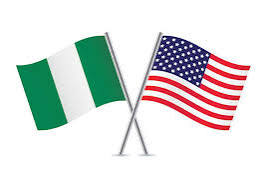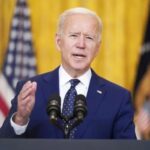Official data has indicated a significant development for U.S.-Nigeria ties, as 34,289 Nigerians have been granted U.S. citizenship between 2020 and 2022, according to the U.S. Department of Homeland Security.
This was detailed in the latest Naturalisations Annual Flow Report, indicating a deepening of U.S.-Nigeria ties.
According to the Annual Flow Report, the data was pulled from Form N-400, the application form for every would-be American citizen.
It was also gathered that the data was drawn from the electronic case files that US Citizenship and Immigration Services (USCIS) use to track each applicant from fingerprinting to the oath ceremony.
A breakdown of the figures showed that 8,930 Nigerians became naturalised citizens between October 2019 and September 2020.
That period included an 11-week COVID-19 shutdown—March 18 – June 4, 2020—that temporarily halted all oath ceremonies.
In 2021, the U.S.-Nigeria ties became more pronounced as 10,921 Nigerians obtained citizenship.
USCIS said the number surged because it worked through its pandemic backlog.
In 2022, the number further soared as 14,438 Nigerians took the oath. This number represents an all-time high for Nigeria and a 32 per cent jump from the previous year.
The three years add up to 34,289 new Nigerian-American citizens, making up around three per cent of all 248,553 Africans who naturalised in that period.
It was also gathered that the surge in citizenship reflects the growing Nigerian diaspora in the U.S., bolstered by strategic U.S.-Nigeria ties in trade, education, and security.
Overall, naturalisations of Africans jumped 40 per cent between 2021 and 2022, the highest increase per region recorded.
Across all regions, Mexico accounted for 326,237 naturalisations for the three years.
India followed with 171,114 naturalisations, steadily rising from 48,111, 57,043 and 65,960 for 2020, 2021 and 2022, respectively.
The Philippines supplied 135,313 new Americans, Cuba (126,203), the Dominican Republic (81,303), Vietnam (80,177), the People’s Republic of China (82,376), Jamaica (57,145), El Salvador (52,399), and Colombia (48,396).
Together, the 10 countries of birth accounted for almost half of all 2.4 million naturalisations completed during the three-year window.
The USCIS notes that application volumes and approvals do not always move in lockstep. Some petitions are denied, while others are decided in a later fiscal year.
The United States’ naturalisation of foreign nationals is based on its Immigration and Nationality Act of 1952.
USCIS, an agency within the Department of Homeland Security, screens applicants, runs FBI name checks and fingerprint searches, reviews five years (three if married to a U.S. citizen) of continuous residence, and tests English literacy and civics knowledge.
According to the Department, “To be considered for naturalisation, an applicant must meet statutory and regulatory requirements and file a Form N-400, Application for Naturalisation, with appropriate documentation.
“U.S. Citizenship and Immigration Services conducts an investigation and examination of all naturalisation applicants, which includes completion of security and criminal background checks, review of the applicant’s complete immigration record, interview(s) with oral and written testimony, testing for English and civics requirements, and qualifications for accommodations or disability exceptions.
“Following approval, USCIS schedules applicants for a required oath ceremony before a judge or authorised executive branch official.
“Generally, to be eligible for naturalisation, applicants must be at least 18 years of age when they submit the Form N-400, establish that they have been a lawfully admitted permanent resident of the United States for at least five years at the time of filing the Form N-400, and have resided continuously in the United States for at least five years as a lawful permanent resident immediately preceding the date of filing the Form N-400 and up to the time of admission to citizenship.”





